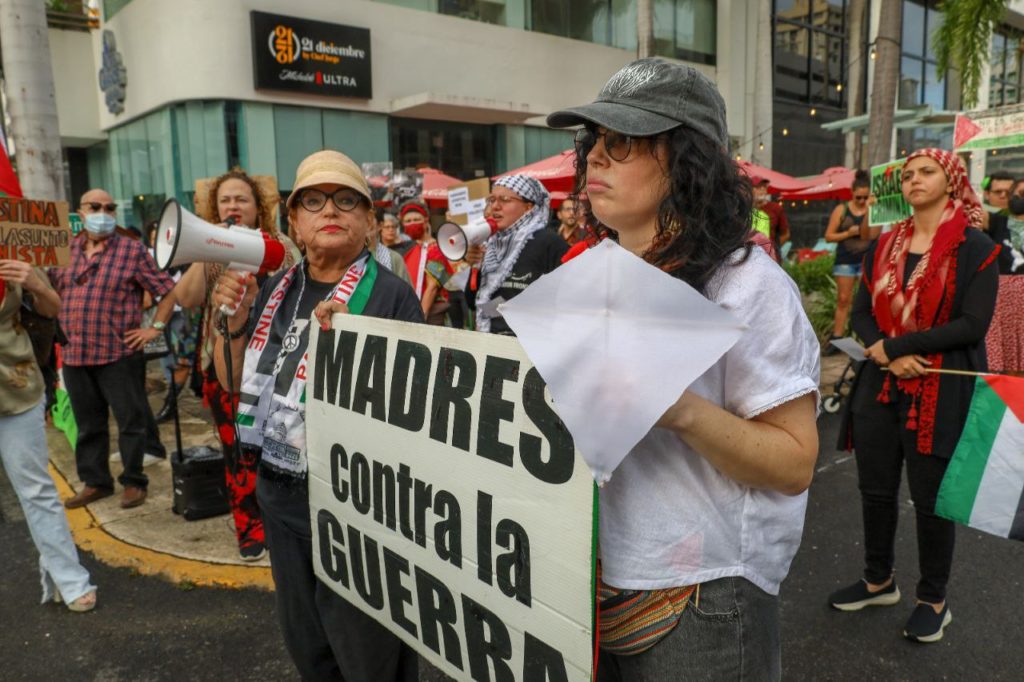Within the boundaries of US-occupied Puerto Rico, the movement for Palestinian liberation has been growing. On December 18, a demonstration organized by students and the Palestinian diaspora on the island marched from the Israeli consulate in San Juan to the US Federal Court. The formation “Mothers Against the War” has been calling protests on a weekly basis outside of the consulate.

Jocelyn Velázquez of Jornada Se Acabaron las Promesas spoke at a November 12 rally outside the Puerto Rico Capitol in San Juan, starting off her speech by applauding the people of Palestine as well as the Palestinian resistance. “We are the guarantee that the world understands that we need to stop this genocide,” she said. “Long live a free Palestine and long live a free Puerto Rico!”
Hundreds took to the streets in San Juan, Puerto Rico to rally in support of Palestine and to demand Israel agree to a cease fire. This is the third such protest in Puerto Rico’s capital since the siege began more than a month ago. pic.twitter.com/mOlEMZI1BK
— BreakThrough News (@BTnewsroom) November 13, 2023
This latest outpouring of support for the Palestinian cause is nothing new on the island. There is in fact a rich history of solidarity with Palestine in Puerto Rico. As Dianne Viera, of the Puerto Rican independence organization Jornada Se Acabaron las Promesas, told Peoples Dispatch, “Like Palestine, we are also a people in resistance, a nation that exists and that continues and will continue to give birth to fighters who will not give up until the liberation of our nation is achieved.”
She added, “The Palestinian cause moves Puerto Ricans first because we recognize that their fight for their right to a dignified life, their independence, and sovereignty is one of the most worthy and admirable causes in the world today. Boricuas who fight for just causes and for the liberation of our nation can recognize ourselves in their cause.”
In 2007, a Puerto Rican environmental activist Alberto de Jesús, known as Tito Kayak, was arrested in occupied Palestine after he climbed a surveillance tower near the infamous “apartheid wall” in the West Bank “and unfurled the Palestinian flag and stayed for hours to draw media attention to the Palestinian cause,” said Viera.
(2007) Tito Kayak 🇵🇷 escala torre vigilancia israelí para izar la bandera palestina 🇵🇸 pic.twitter.com/eesJftEAro
— cesatre (@CesarAtre) November 5, 2023
During a demonstration on November 5 in 2023, Tito Kayak harkened back to his 2007 direct action and scaled the flagpole outside of Puerto Rican capitol, replacing the United States flag with the flag of Palestine. Kayak is known for messing with the US flag outside the capitol, replacing it with the Puerto Rican flag in 2019 at the height of the #RickyRenuncia protests.
In 2008, the Palestine Solidarity Network (Red de Solidaridad con Palestina) was formed to denounce the ongoing Israeli assault against Gaza. This organization has been active in promoting solidarity with Palestine since then and has been involved in organizing the large protests on the island following October 7.
❗️🇵🇷🇵🇸 Cientos de personas marcharon este domingo por las calles de la capital de Puerto Rico en apoyo a #Palestina y para exigir un cese el fuego en la Franja de Gaza.
La manifestación, convocada por la Red de Solidaridad con Palestina, llegó hasta la sede del Tribunal de #EEUU… pic.twitter.com/s9qUEmGnar
— Luis De Jesús 🇵🇷 (@ldejesusreyes) November 13, 2023
Like Palestine, Puerto Rico has a history of militant, organized resistance. Viera makes note of the attack carried out against the United States Congress in 1954 by Puerto Rican liberation fighters such as Lolita Lebron. She also mentions the revolts for independence that broke out in 1950 led by celebrated Puerto Rican nationalist leader Pedro Albizu Campos. Much later, Operation Pitirre II in 1981 was carried out by the Boricua Popular Army, that “shot down planes that would leave from the Muñiz Base in San Juan in operations against the libertarian struggles of Latin America.”
“The Puerto Rican nation has experienced colonial violence by the United States government since it invaded and occupied our territory illegally in 1898 through an act of war,” Viera emphasized. “Since then, the nation has been subordinated and strangled economically and politically by the US empire, and Puerto Rican men and women are treated as an inferior race.”
“Both struggles, the Palestinian and the Puerto Rican are linked. We Puerto Ricans are aware that we live oppressed by a colonial system imposed by the US empire. We face the same genocidal torturing empire that hides behind colonialist intermediaries.” Viera said.





